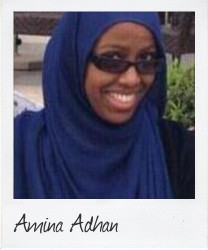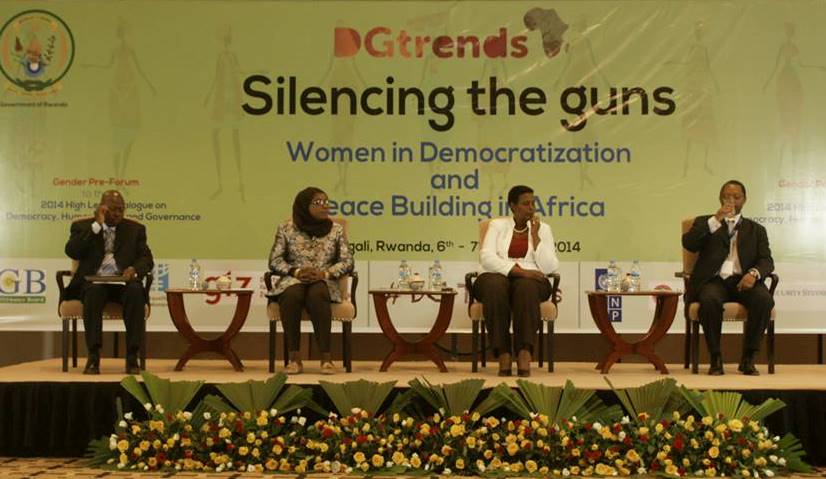"Silencing the guns in Africa by 2020: women's role"
October 31 Women can help bring peace and development to Africa, writes Amina Adhan, 22, a Correspondent from Nairobi, Kenya, who reports on a forum that examined the hurdles and the opportunities for women looking for political and social empowerment.
Women can help bring peace and development to Africa, writes Amina Adhan, 22, a Correspondent from Nairobi, Kenya, who reports on a forum that examined the hurdles and the opportunities for women looking for political and social empowerment.
Kigali, Rwanda, recently hosted a forum sponsored by the African Union, seeking to understand the challenges for women’s participation in governance, leadership and peace building.
Among the challenges noted are the disconnected efforts by different women’s groups. They have diverse backgrounds; it has therefore been difficult to have one strong voice, noted a women’s rights advocate from South Sudan. Furthermore the struggles for women in peacemaking were not only in reconciling the differences of religion and ethnicity but also in the hard line positions men take during conflict. Moreover, the different development partners support local organizations but do not speak in one voice.
If women are to effectively contribute to silencing the guns, all efforts at all levels should be concerted. Women as Partners for Peace in Africa is a continental women’s group supported by the African Union. It buttressed efforts by local women’s groups to have their voice heard in the Inter Congolese dialogue for peace.
The quest for women’s effective participation in governance and attainment of all the rights of the larger society should involve men, asserted a participant from Congo Men’s Network (a group working to nurture men who respect women’s rights).Women’s rights groups should therefore have clear policies to bring men on board in the struggle to include women in governance. Men are core actors who either facilitate or hinder women’s access to political space, and are also key perpetrators of violence against women. Women should therefore recognize men as allies for peace and confronting structural violence.
Throughout the session there were calls for the African Union and African states to address root causes of conflict. Poverty was noted amongst the top causes; Africa’s large unemployed youth demographic is easily absorbed into militias and terror groups. Sustainable peace can only be achieved by empowering the youth who otherwise support warring parties; silencing the guns by engaging hands that hold the guns.
To enhance women’s participation in peace processes, African governments should counter barriers such as the stereotype that women play “traditional roles” but not decision-making in political negotiations for peace. Inclusion of women has gender dividends that consolidate peace as seen in Rwanda. Women have been sidelined in the Burundi peace accord, where they have observer positions in the negotiations but were barred from input on deliberations.
Women can have influence over men, as noted in the book “War through the eyes of a Somali Woman”. Women, though not mostly militarized, can use their soft power to urge men to put down arms. Women are also able to mobilize the social capital required for sustainable peace as they are custodians of values passed down to generations and can nurture a culture of peace and equality. Women also need to holistically lobby for their political rights and not merely stick to seeking protection for women against violence, although that has been a starting point for many women’s rights groups. A Darfur peace maker noted women in South Sudan were able to progress to advocate for political rights, which they secured in a comprehensive peace agreement.
African countries should borrow best practices in gender policy from Rwanda and have special programs for women in democratization and peace building. Governments should also invest in institutions that allow women to advocate for themselves and for their rights to influence decision making. Decentralization is one way to ensure women’s participation through grass root decision-making.
The African governments should have capacity building programs for women, where people are able to craft their own solutions to challenges they face. Indigenous knowledge held by communities should be invoked so as to have a people-led peace process.
Civic education will create the political will to allow inclusion of women by eradicating structural barriers. As women give input on local level decisions, their representation will materialize. Governments should have follow up mechanisms to ascertain outcomes of having women in leadership. Rwanda has been able to consolidate peace through women’s involvement because the government of Rwanda has invested in gender mainstreaming in all sectors.
Strategies to popularize women’s empowerment should include a women’s fund to give women access to the political space and peace-building skills. Economic empowerment should also involve education about the funds and development projects targeting women’s participation.
Photo – DGTrends.org
………………………………………………………………………………………………………………
About me: I am currently pursuing a degree in International Relations at United States International University – Africa (USIU-A). I have served as the Inter-governmental organizations liaison for Youth Alliance for Leadership and Development in Africa (YALDA) – USIU chapter 2013-2014. I am passionate about peace, women empowerment and youth empowerment. I believe to have lived is to have made an impact in people’s lives and as such I am always looking to inspire others to learn more, be more and do more.
………………………………………………………………………………………………………………
Opinions expressed in this article are those of the author and do not necessarily represent the views of the Commonwealth Youth Programme. Articles are published in a spirit of dialogue, respect and understanding. If you disagree, why not submit a response?
To learn more about becoming a Commonwealth Correspondent please visit:
http://www.yourcommonwealth.org/submit-articles/commonwealthcorrespondents/
………………………………………………………………………………………………………………




